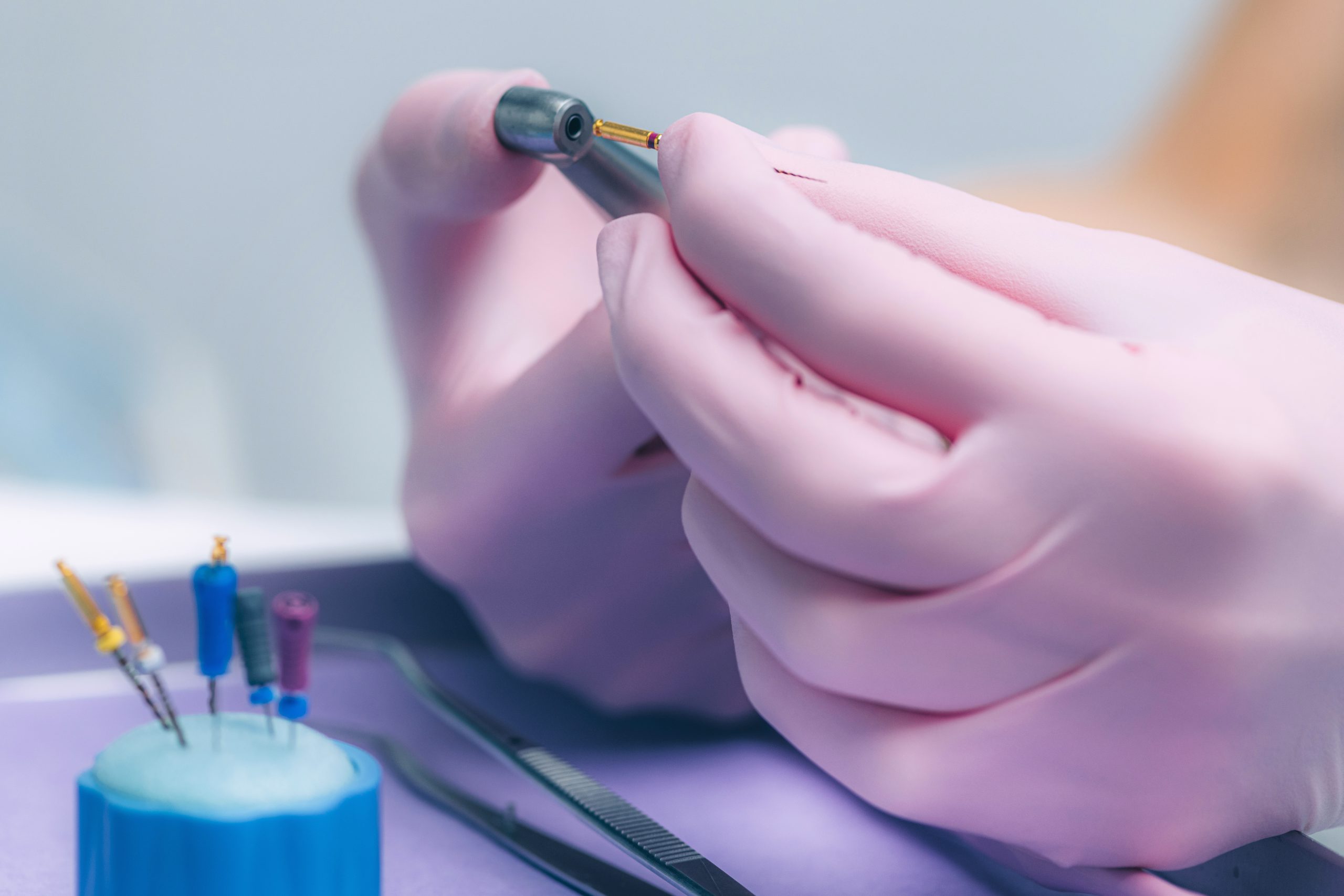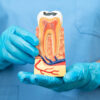Root canal treatment is one of the most common methods to tooth decaying. This post aims to enlighten readers about root canal treatment, food should be preferred after operation and aftercare of new teeth.
What Is A Root Canal Treatment?
Root canal is a dental procedure used to treat infections of the tooth’s pulp. The pulp is the soft tissue inside the tooth that contains nerves, blood vessels, and connective tissue. When this tissue becomes infected or damaged, it can cause severe pain and other symptoms. A root canal removes the infected or damaged pulp from the tooth, then seals it off to prevent further infection.
Root canals are often recommended when a cavity has reached the inner layers of the tooth, or when an injury or trauma has caused damage to the nerve. Root canals are also used to treat abscesses, which are collections of pus that form around the root of a tooth due to infection.
The root canal procedure typically involves two visits to your dentist. During your first visit, your dentist will numb your mouth with local anesthesia and make an opening in your tooth so they can access its interior. They will then use small tools to remove any infected or damaged tissue from inside the tooth. After all of the infected material has been removed, they will fill and seal off the area with a special material called gutta-percha.

On your second visit, your dentist will check that everything looks good and place a crown over your treated tooth for protection. This crown may be made out of porcelain, gold alloy, or composite resin depending on where in your mouth it is located and what type of restoration you need.
Root canals are usually successful in treating most cases of infection or damage within teeth; however, there are some instances where additional treatments may be necessary if there is persistent pain after treatment or if an abscess returns after treatment. In these cases, further procedures such as endodontic surgery may be recommended by your dentist in order to ensure complete resolution of symptoms and successful healing of the affected area.
Overall, root canal therapy is an effective way to save teeth that have been damaged by decay or trauma and prevent further complications from developing due to infection or inflammation within them. If you experience any signs of infection within one of your teeth such as severe pain when chewing food or drinking hot/cold liquids then it’s important that you seek immediate dental care in order to determine whether root canal therapy is necessary for you.
What Causes To Decay Root Canal?
Root canal decay is caused by a variety of factors, including poor oral hygiene, deep cavities, trauma to the tooth, and bacterial infection. The most common cause of root canal decay is bacteria that enter the inner layers of the tooth through a crack or cavity. When bacteria enter the inner layers of the tooth, they can cause an infection in the pulp tissue and lead to inflammation and pain. If left untreated, this infection can spread to other parts of the body and cause serious health problems.
Good oral hygiene is essential for preventing root canal decay. Brushing your teeth twice a day with fluoride toothpaste and flossing daily can help remove plaque and food particles from between your teeth that can lead to cavities. Additionally, regular dental checkups are important for detecting any early signs of decay so that it can be treated promptly before it progresses into a more serious problem.
Deep cavities are another common cause of root canal decay. Cavities form when bacteria in plaque attack the enamel on your teeth, creating holes in them. If these cavities are not filled with a filling material soon enough, they can reach down into the deeper layers of your teeth where they may eventually reach the pulp tissue and cause an infection. Regular dental checkups are important for detecting any cavities so that they can be filled as soon as possible before they become too deep.

Trauma to the tooth is another potential cause of root canal decay. Trauma could include an injury such as a blow to the face or grinding your teeth at night while you sleep which can damage the enamel on your teeth and create openings for bacteria to enter into deeper layers of your teeth where they may eventually reach the pulp tissue and cause an infection. Wearing a mouthguard while playing sports or grinding your teeth at night may help prevent trauma-related damage to your teeth which could lead to root canal decay if left untreated.
Bacterial infections are also one of the leading causes of root canal decay. Bacteria from plaque on your teeth or from food particles stuck between them can travel down into deeper layers of your tooth where they may eventually reach the pulp tissue and cause an infection which leads to inflammation and pain if left untreated for too long. Good oral hygiene practices such as brushing twice daily with fluoride toothpaste and flossing regularly will help reduce plaque buildup on your teeth which reduces their risk for bacterial infections leading to root canal decay if left untreated for too long.
In conclusion, there are several causes of root canal decay including poor oral hygiene, deep cavities, trauma to the tooth, and bacterial infections all which should be addressed promptly by visiting a dentist regularly for checkups so that any early signs of decay can be detected before it progresses into a more serious problem requiring more extensive treatment such as a root canal procedure or extraction.
What Can Be Done To A Decayed Root Canal?
Root canal treatment is a common procedure used to save teeth that have been damaged due to decay or infection. When a tooth has decayed, the pulp inside the tooth can become infected and cause severe pain. To save the tooth, root canal treatment is necessary to remove the infected pulp and replace it with an artificial material. This procedure can be completed in one or two visits, depending on the severity of the damage.
When a decayed root canal is detected, it’s important to seek treatment as soon as possible. If left untreated, the infection can spread and cause more serious complications such as an abscessed tooth or even jawbone deterioration. During a root canal procedure, your dentist will first numb the area around the affected tooth so you won’t feel any discomfort during treatment. Next, they will use specialized tools to access the inner chamber of your tooth and remove any damaged tissue or debris. Once this is done, they will fill in the space with an artificial material such as gutta-percha or resin composite.
After your root canal procedure is complete, you may experience some soreness for a few days afterward. Your dentist may prescribe antibiotics to help prevent infection and over-the-counter pain medications for any discomfort you may have. Additionally, they may suggest having a dental crown placed over your treated tooth for extra protection against further damage or decay.
If you think you may need root canal treatment due to decayed roots, it’s important to visit your dentist right away for proper diagnosis and treatment options. Root canal therapy can help restore your smile and prevent further complications from occurring down the line. With proper care and maintenance after your procedure is complete, you should be able to enjoy your restored smile for many years to come!
At our office we understand how important it is for our patients to receive quality care when dealing with decayed roots in their teeth. Our experienced dentists are trained in providing effective root canal treatments that are tailored specifically for each patient’s individual needs. We use state-of-the-art technology and techniques when performing these procedures so our patients can rest assured knowing they are receiving only the best care available today!

What Should I Eat After Root Canal Treatment?
Root canal treatment is a common dental procedure used to repair and save a tooth that is badly decayed or infected. After the root canal, it is important to follow your dentist’s instructions for aftercare, including what to eat. Eating the right foods can help you heal faster and ensure your root canal was successful.
When it comes to eating after a root canal, soft foods are usually best. Soft foods are easier on your teeth and gums, which can be sensitive after the procedure. Additionally, these types of foods require less chewing, which can be uncomfortable if you’re still experiencing some pain from the root canal.
Here are some great options for soft foods to eat after a root canal:
• Soup:
Soups are an excellent option for post-root canal meals because they provide plenty of nutrients in an easy-to-eat form. Try making homemade soups with vegetables and lean proteins like chicken or fish for added nutrition.
• Yogurt:
Yogurt is full of probiotics that can help promote healthy digestion and boost your immune system. Choose plain yogurt with no added sugar or artificial sweeteners and top it with fresh fruit or nuts for extra flavor and crunch.
• Smoothies:
Smoothies are another great way to get in plenty of nutrients without having to chew too much. Blend together fruits, vegetables, nuts, seeds, and dairy or non-dairy milk for a delicious smoothie that will keep you feeling full and satisfied.
• Mashed potatoes:
Mashed potatoes are an ideal food choice after a root canal because they’re soft yet still provide plenty of carbohydrates for energy. Add butter or cream cheese for extra flavor if desired.

• Applesauce:
Applesauce is an excellent source of fiber as well as vitamins A and C. It’s also naturally sweet so you don’t have to add any additional sugar or sweeteners if you don’t want to!
• Oatmeal:
Oatmeal is high in fiber and protein which makes it a great breakfast option after a root canal procedure. Top with fresh fruit or nuts for extra flavor and crunch if desired.
• Eggs:
Eggs are another great source of protein that doesn’t require much chewing at all! Scramble them up with some veggies like spinach or tomatoes for added nutrition or make yourself an omelet filled with your favorite ingredients like cheese and mushrooms.
• Soft fruits:
Fruits like bananas, melons, peaches, pears, grapes, kiwis, mangos etc., are all good choices after a root canal because they require minimal chewing yet still provide plenty of vitamins and minerals needed for healing post-procedure!
In addition to eating soft foods after your root canal treatment it is also important to stay hydrated by drinking plenty of water throughout the day (at least 8 glasses). Avoiding hard candies or other sugary treats can also help prevent further damage from occurring in the area where the root canal was performed as well as reduce any discomfort associated with the procedure itself. Finally, try not to chew gum as this could irritate the area where the procedure was done even more than necessary!

How Should I Treat My Teeth After Root Canal Treatment?
After root canal treatment, it is important to take good care of your teeth in order to ensure the success of the procedure and maintain good oral health. Here are some tips for how to treat your teeth after root canal treatment:
Take Care of Your Toothbrush:
Make sure you replace your toothbrush every three months or sooner if the bristles become frayed. It is also important to use a soft-bristled brush and brush gently, as vigorous brushing can damage the newly treated area.
Floss Regularly:
Flossing helps remove plaque and food particles from between your teeth and around the gum line where a toothbrush can’t reach. This will help keep bacteria levels low and prevent further decay or infection in the area.
Avoid Hard Foods:
After root canal treatment, it is important to avoid hard foods such as nuts, popcorn kernels, ice cubes, and hard candy as these can cause further damage to the treated area. Stick with softer foods such as mashed potatoes, yogurt, oatmeal, applesauce, and bananas until you have fully healed from the procedure.

Use Fluoride Products:
Using fluoride products such as toothpaste or mouthwash can help strengthen your enamel and protect against further decay or infection in the treated area.
Visit Your Dentist Regularly:
It is important to visit your dentist regularly for checkups and cleanings after root canal treatment in order to ensure that everything is healing properly and that there are no signs of infection or decay in the area.
Practice Good Oral Hygiene Habits:
In addition to regular visits with your dentist, it is also important to practice good oral hygiene habits at home such as brushing twice daily with fluoride toothpaste, flossing once daily, using an antiseptic mouthwash regularly, avoiding tobacco products, limiting sugary snacks and drinks, eating a balanced diet rich in calcium-rich foods like dairy products and leafy greens; all of these things will help promote healthy teeth after root canal treatment.
By following these tips for how to treat your teeth after root canal treatment you can ensure that your newly treated tooth remains healthy for years to come! If you have any questions about how best to care for your teeth after this procedure please contact your dentist for more information on what steps you should take moving forward!
Frequently Asked Questions
Does It Hurt To Get a Root Canal Treatment?
No, getting a root canal does not hurt. In fact, most people report feeling little to no pain during the procedure. Root canals are performed by dentists to remove infected or damaged tissue from inside the tooth and prevent further damage. During the procedure, your dentist will numb the area with local anesthesia so you won’t feel any discomfort. They’ll then use specialized tools to clean out the infected pulp from inside the tooth and seal it off with a filling material. Afterward, you may experience some mild soreness in your mouth for a few days, but this should go away on its own. Overall, getting a root canal is not painful and can help save your tooth from further damage or infection.
Is There Any Treatment Other Than Root Canal Treatment For Decayed Tooth?
Yes, there are other treatments available for decayed teeth other than root canal treatment. One of the most common treatments is a dental filling. This procedure involves removing the decayed portion of the tooth and replacing it with a special filling material such as composite resin or amalgam. The filling material helps to restore the strength and function of the tooth while also preventing further decay.
Another option is a dental crown. A crown is a custom-made cap that fits over the entire surface of a damaged tooth, protecting it from further damage and restoring its appearance and function. Crowns can be made from metal, porcelain, or ceramic materials depending on your individual needs.
If your tooth decay is too severe for either of these treatments, you may need to have an extraction done instead. During this procedure, your dentist will remove the entire tooth from its socket in order to prevent further damage and infection. Once your mouth has healed, you can then discuss options for replacing the missing tooth with an implant or bridge.
No matter which treatment you choose for your decayed tooth, it’s important to visit your dentist regularly so they can monitor any changes in your oral health and provide timely treatment if needed. With proper care and maintenance, you can keep your smile healthy and beautiful for years to come!
How Long Root Canal Treatment Lasts?
The duration of root canal treatment depends on several factors, such as the severity of the infection, size and shape of the root canals, and complexity of the case. Generally, it takes one to three visits to complete a root canal procedure. During each visit, your dentist will clean out any infection or debris in your root canals and fill them with a special material called gutta-percha. Afterward, your dentist may place a crown over your treated tooth for added protection. With proper care and regular checkups, you can expect your root canal treatment to last for many years. If you experience any pain or discomfort after your procedure, contact your dentist right away for further evaluation and treatment.




